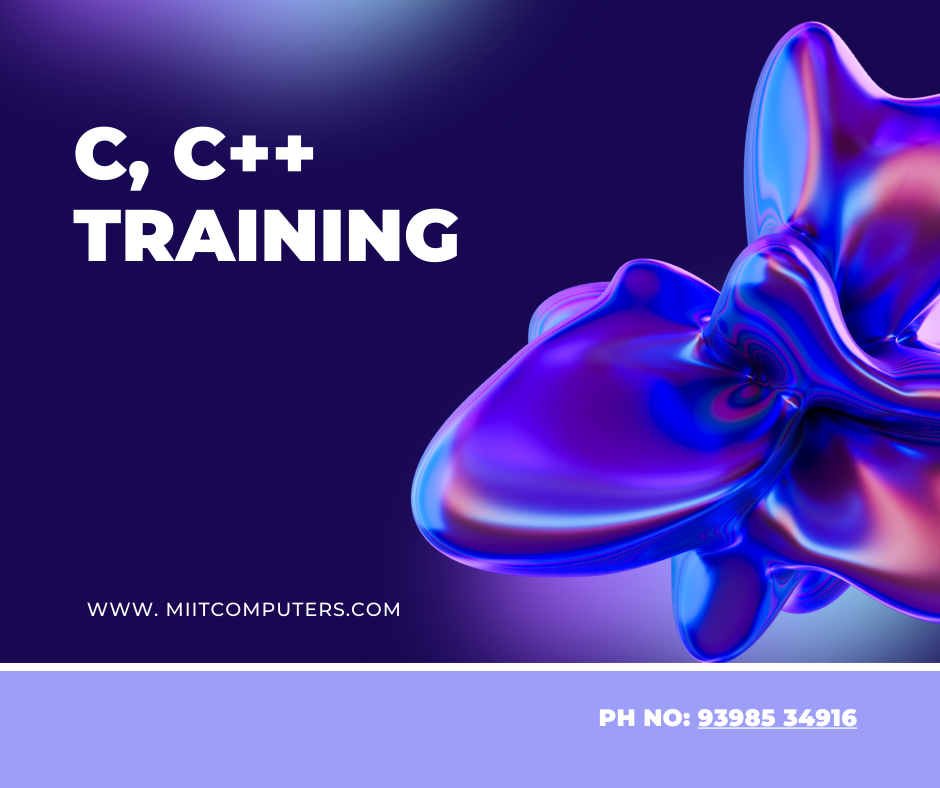A C Language course is a foundational program designed to teach individuals the principles and practical skills of the C programming language. C is a powerful, versatile, and widely used language known for its efficiency and its ability to provide low-level memory access, making it suitable for system programming as well as application development. C Language Course Training In Hayathnagar.
Here’s a breakdown of what a typical C Language course might cover:
Core Concepts and Topics:
- Introduction to Programming and C:
- What is programming?
- Different types of programming languages.
- History and features of the C language.
- Basic structure of a C program.
- Compilation process.
- Introduction to Integrated Development Environments (IDEs).
- Fundamentals of C:
- Keywords, identifiers, and constants.
- Data types (int, float, char, double, void).
- Variables: declaration, initialization, and scope.
- Operators: arithmetic, relational, logical, assignment, bitwise, etc.
- Expressions and operator precedence.
- Basic input and output functions (
printf,scanf). - Comments in C.
- Control Flow Statements:
- Conditional statements (
if,else,else if,switch). - Looping structures (
while,do-while,for). - Jump statements (
break,continue,goto).
- Conditional statements (
- Functions and Modular Programming:
- Defining and declaring functions.
- Function parameters and return values.
- Function prototypes.
- Call by value and call by reference.
- Recursion.
- Storage classes (auto, static, extern, register).
- Standard library functions.
- Arrays and Strings:
- Declaring and initializing one-dimensional and multi-dimensional arrays.
- Accessing array elements.
- Arrays and functions.
- Character arrays and strings.
- String manipulation functions (e.g.,
strcpy,strcat,strlen,strcmp).
- Pointers and Memory Management:
- Understanding pointers: address of a variable.
- Pointer declaration and initialization.
- Dereferencing pointers.
- Pointer arithmetic.
- Pointers and arrays.
- Pointers and functions.
- Dynamic memory allocation (
malloc,calloc,realloc,free).
- Structures and Unions:
- Defining and declaring structures.
- Accessing structure members.
- Arrays of structures.
- Pointers to structures.
- Unions and their usage.
- Typedef and enumerated types.
- File Handling:
- Opening and closing files.
- Reading from and writing to files (text and binary).
- File pointers and file operations.
- Error handling during file operations.
- Preprocessor Directives:
#include,#define,#ifdef,#ifndef, etc.- Macros.
- Command Line Arguments:
- Understanding
argcandargv. - Using command-line arguments in C programs.
- Understanding
- Introduction to Data Structures (Often in more advanced courses):
- Basic concepts of linked lists, stacks, queues, etc. (implementation using C).
Training Methodology:
- Comprehensive Curriculum: Covering fundamental to advanced C concepts.
- Hands-on Practical Training: Emphasis on writing and executing C programs.
- Experienced Instructors: Professionals with a strong understanding of C and its applications.
- Live Coding Sessions: Demonstrating concepts through practical examples.
- Assignments and Exercises: Reinforcing learning through problem-solving.
- Projects: Developing small to medium-scale C applications.
Benefits of Learning C:
- Strong Foundation: C provides a solid understanding of fundamental programming concepts that are transferable to other languages.
- Efficiency and Performance: C allows for low-level memory manipulation, resulting in efficient and fast code execution.
- System Programming: C is the language of choice for developing operating systems, system software, and embedded systems.
- Understanding Computer Architecture: Learning C helps in understanding how computers work at a lower level.
- Portability: C programs can often be compiled and run on various platforms with minimal modifications.
- Influence on Other Languages: Many popular programming languages like C++, Java, and C# have borrowed syntax and concepts from C.
- Wide Range of Applications: C is used in diverse areas, including game development, scientific computing, database management systems, and more.
- Open Source Contribution: A vast amount of open-source software is written in C, providing opportunities for contribution.
Course Duration and Fees (in Hyderabad):
The duration and fees for a C Language course in Hyderabad can vary significantly depending on the institute, the depth of the curriculum, and the mode of learning (online/offline).
- Short-term Certification Courses: These can range from a few weeks to a few months, with fees potentially ranging from ₹3,000 to ₹15,000 or more.
- Diploma Courses: Diploma programs in computer programming with a focus on C can last from 1 to 2 years, with fees varying from ₹4,000 to ₹2,00,000 per year depending on the institution.
- Degree Programs (BCA, B.Tech): C is often a core subject in undergraduate computer science degrees that span 3 to 4 years, with annual fees ranging from ₹5,000 to ₹5,00,000 or more.
- Online Courses: Numerous online platforms offer C programming courses with varying durations (from a few hours to several months) and fees (from free to ₹10,000 or more).
For specific details on course duration and fees in Hyderabad, it is recommended to research local training institutes and online course providers. Many institutes in areas like Ameerpet offer specialized C language training.
A C Language course provides a valuable stepping stone into the world of programming and remains a relevant skill in today’s technology-driven environment, especially for those interested in system-level programming and understanding the fundamentals of computation.


